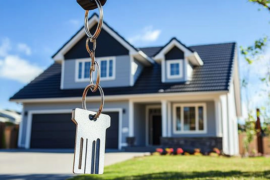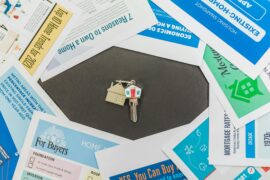This article may contain references to products or services from one or more of our advertisers or partners. We may receive compensation when you click on links to those products or services. Nonetheless, our opinions are our own.
You might find yourself nearing retirement with most of your money and assets entangled in your property. But how can you use this to your advantage? One of the most well-liked strategies for not selling and moving is getting a reverse mortgage. A total of 64,489 reverse mortgages were sanctioned in the United States in FY 2022.
A loan that doesn’t need to be repaid right away can seem like your only choice when you desperately need access to the equity in your house. But it’s important to know the details of such a deal. The most prevalent kind of reverse mortgage is the home equity conversion mortgage (HECM), commonly known as the Federal Housing Administration reverse mortgage.
If you’re not sure what to do next or need additional reverse mortgage information, these five facts regarding these types of mortgages will help you make an educated choice.
Not Everyone Qualifies
The goal of reverse mortgage loans is to provide retirees the freedom to remain in their own houses as they age. This implies that the following conditions must be true in order to qualify for a reverse mortgage:
- You need to be 62 years or older to apply;
- The home must be yours;
- You must have adequate equity (at least 50%);
- You must permanently live in the house;
- You need a good credit score.
If you don’t satisfy the standards as a homeowner, understanding this sooner rather than later will save you time and enable you to explore alternative choices. While you can’t change your age, you can try to raise your home equity or improve your credit score. This way, you’ll be qualified for a reverse mortgage loan.
As Debt Rises, Equity Falls
The minimum equity required by the reverse mortgage lender is fifty percent. Although you’ll be receiving regular cash payments in exchange for your house’s equity, the value of your property will gradually diminish. Interest and other costs accrued throughout the duration of the loan are proportional to the borrower’s declining equity.
Over the course of your loan, your interest rate will apply to a greater principal balance. No payments on the loan are required while you’re a homeowner. Even if you sell the house, move out, or die, you’ll still have to pay off the debt. So, if you want to leave your property as an inheritance, a reverse mortgage is not the best choice because of the short loan period.
You’re Still Responsible for Home Maintenance
While a reverse mortgage borrower does not have to worry about making payments to the lender, they’re still liable for all other expenditures associated with keeping the property in good shape. Since you’ll be keeping the deed to your house, you’ll be responsible for things such as:
- Homeowners insurance;
- Property tax;
- Utilities;
- Cost of upkeep.
If you don’t take care of these things, your lender might demand that you pay back the loan or force you to sell the house if you can’t make the payments.
Possible Changes to Your Benefits Due to a Reverse Mortgage
Borrowers will not have their government benefits reduced or eliminated. However, other benefits, such as Medicaid and Supplemental Security Income (SSI), could be impacted, so it’s vital to speak with experts to learn more about how this will apply to your unique circumstances.
What Will Happen to the Mortgage and Your House After You Pass Away
It’s critical to think about what will happen to the reverse mortgage once you pass away. After all, this choice might have serious repercussions for your loved ones. What occurs next is conditional on whether or not:
- A co-borrower is involved. If you and a qualifying spouse or partner are co-borrowers on a reverse mortgage, you’ll both share in the loan proceeds. It also ensures that the surviving spouse can continue living in the house and collecting the payments in the event of the first spouse’s untimely death.
- There is no cosigner involved. A ‘non-borrowing spouse’ might be required to move out or sell the property if they cannot make the monthly payment.
- Your family wants to retain the house. The equity decline can reduce the inheritance available to loved ones. And any family members or heirs other than the borrower would have to repay the reverse mortgage loan themselves to maintain the house.
Final Thoughts
If you find yourself wondering what to do with your property after retirement because most of your money and assets are entangled in it, a reverse mortgage can be a great option. If you’re considering this type of loan as an alternative to a traditional home equity loan but are unclear about what to do next, these five facts can help clear things up. In addition, consult a financial expert to guide you through the process and help you acquire this particular loan.

Reviewed and edited by Albert Fang.
See a typo or want to suggest an edit/revision to the content? Use the contact us form to provide feedback.
At FangWallet, we value editorial integrity and open collaboration in curating quality content for readers to enjoy. Much appreciated for the assist.
Did you like our article and find it insightful? We encourage sharing the article link with family and friends to benefit as well - better yet, sharing on social media. Thank you for the support! 🍉
Article Title: Quick Reverse – Mortgage Facts To Keep in Mind
https://fangwallet.com/2023/05/23/quick-reverse-mortgage-facts-to-keep-in-mind/The FangWallet Promise
FangWallet is an editorially independent resource - founded on breaking down challenging financial concepts for anyone to understand since 2014. While we adhere to editorial integrity, note that this post may contain references to products from our partners.
The FangWallet promise is always to have your best interest in mind and be transparent and honest about the financial picture.
Become an Insider

Subscribe to get a free daily budget planner printable to help get your money on track!
Make passive money the right way. No spam.
Editorial Disclaimer: The editorial content on this page is not provided by any of the companies mentioned. The opinions expressed here are the author's alone.
The content of this website is for informational purposes only and does not represent investment advice, or an offer or solicitation to buy or sell any security, investment, or product. Investors are encouraged to do their own due diligence, and, if necessary, consult professional advising before making any investment decisions. Investing involves a high degree of risk, and financial losses may occur including the potential loss of principal.
Source Citation References:
+ Inspo












































